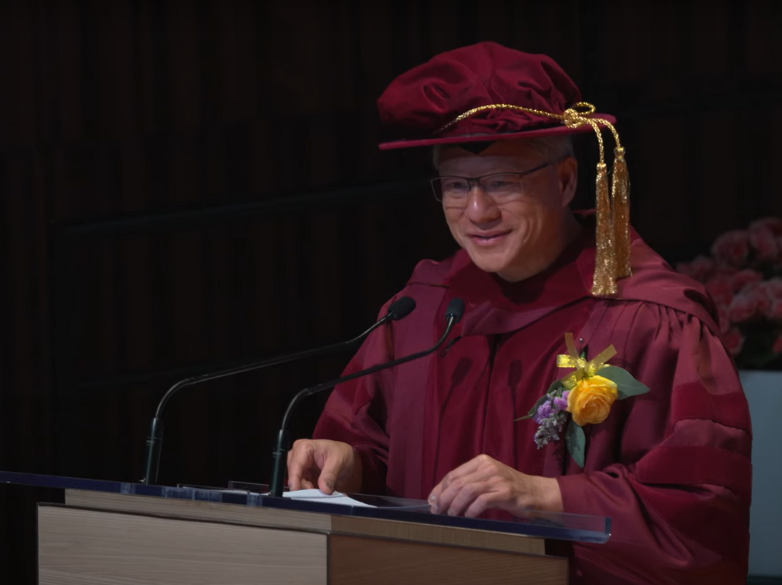“The age of AI has started… The whole world is reset. You are at the starting lines with everyone else. Industries are being reinvented. New industries are being created.” When I heard Jensen Huang, CEO of Nvidia, say these words to graduating students while receiving his Honorary Doctorate at HKUST, I was filled with optimism about the opportunities that today’s MBA students are well-placed to pursue. Seasons of change are seasons of opportunity.
However, pursuing new opportunities is not easy. During a fireside chat at HKUST’s Shaw Auditorium later that afternoon, Dr. Huang shared that one of his key learnings from 31 years as a CEO is “You have to reinvent yourself constantly.”
For prospective MBA students seeking to ‘reinvent’ themselves, I’d like to share my reflections on three lessons on leadership that I drew from Dr. Huang’s fireside chat.

(“I’m a HKUST alumnus!", Jensen Huang)
Lesson 1: Leaders co-create with their community
Dr. Huang is well known as a unique CEO with 60 direct reports. This is much more than the 10-12 direct reports of a typical CEO. How does Dr Huang do this? He said, “Transparency. I reason in front of everybody about what we need to do… By the time there is a direction for the company, a strategy for the company, or a decision to make, everybody reasoned about it together… We got to the answer together.” By engaging in open two-way communication with a broad set of his colleagues, Dr. Huang’s leadership style simultaneously accomplishes two critical tasks for leading change. First, he is ensuring that relevant information and diverse perspectives are included in the decision-making process. Second, he is building alignment and commitment among his leadership team to support and execute their decisions.
Because of its importance to effective leadership, helping students learn to ‘reason in front of everybody’ is a key design goal of our MBA program. Our classrooms and case teaching method allow groups of 60 students to discuss, debate, and decide on a course of action for the many companies used in our case studies. By learning to share their own ideas while actively listening to their classmates, our MBA students learn how to lead by co-creating.

(From the right: Dr. Harry Shum is HKUST Council Chairman and former Microsoft EVP leading AI and Research.)
Lesson 2: Leaders are not afraid to ask for help
With his signature black leather jacket, it would be easy for Dr. Huang to position himself as the all-knowing guru of AI effortlessly steering Nvidia to its next trillion dollars of growth in market capitalization. However, Dr. Huang made clear that leaders cannot succeed alone. As he explained: “The fact that you’re strong doesn’t mean that you can’t be vulnerable. Meaning that if you need help, ask for help.”
Asking for help, however, is not always easy, especially for leaders who can feel intense pressure to project confidence and strength. This is why our MBA program actively encourages students to learn to ask for help. By studying with talented peers who will become tomorrow’s business leaders, our students experientially realize that successful leaders are -- surprise? -- just as human as themselves. Throughout our MBA program, we require students to work together in teams. This helps students practice receiving help from their classmates. The students who get the most out of our program ask for help from each other, from their professors, from our MBA program, and from our alumni. Asking for help is not just an important skill while a student, but for a life in leadership.

Lesson 3: Leaders concentrate on helping others
How does a company become valued at over $3 trillion dollars? An analyst might say ‘By capturing value.’ A leader will say ‘By creating value.’ During the fireside chat, Dr. Huang stressed a key leadership mindset that he wanted to share with us: “One fundamental idea: Don’t do it for yourself, do it for everyone else. Leaders are fundamentally trusted when every single decision that is made is in the interest of the mission. It’s in the interest of others. It’s in the interest of other people’s success.”
Those words, in my view, are worth much more than even the most advanced Nvidia GPU. Caring about the interests of others is how leaders can build trust with their communities, how they can find the motivation to persevere through challenging times, and how they can define a noble mission.
For MBA applicants looking to reinvent themselves to become the business leaders for the age of AI, I would encourage you to ask yourself: Will your career be about yourself? Or will your career be about contributing to others?
The future is exciting—today’s industries will be reinvented, and new industries will be created. And there will be limitless opportunities to help others succeed

